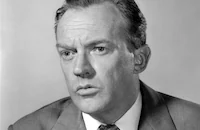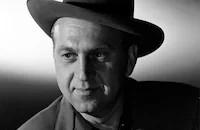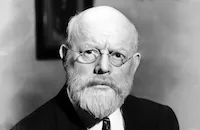Strange Alibi

Brief Synopsis
Cast & Crew
D. Ross Lederman
Arthur Kennedy
Joan Perry
Jonathan Hale
John Ridgely
Florence Bates
Film Details
Technical Specs

Synopsis
When King Carney, a grand jury witness, is gunned down before he can testify, gangster Louie Butler is suspected. After a manhunt, Butler is arrested, but is later found hanging in his cell. Police Chief Sprague is skeptical, believing that Butler was not the kind of man to hang himself. Together with Joe Geary, the only policeman on the force whom Sprague trusts, he devises a plan to root out corruption in the city. As part of the plot, Joe is publicly accused of consorting with criminals and suspended from the force. He is taken in by Crips Vossen, who collects from businesses running crooked gambling games. Joe's job is to learn the identity of "Lockland," the head of the crime syndicate. When Joe proves himself to Vossen, he is taken to meet Lockland, who is revealed to be police captain Reddick. With his henchman, Lieutenant-Detective Pagle, Reddick was responsible for the deaths of Carney and Butler. Joe forcibly takes Benny McKaye, one of the men working for Reddick, to testify for Sprague, but they are followed by Pagle, who then kills Sprague and wounds Joe. Benny escapes and Pagle puts the gun that killed Sprague in Joe's hand. Without any witnesses, no one believes Joe's story that he was working undercover, and he is sentenced to life in prison. Joe's fiancée, Alice Devlin, is convinced that he is innocent, and together with their old friend Katie, a victim of the syndicate, searches for Benny, who is Joe's only hope. In prison, Joe is victimized by the guards and the other criminals. Some time later, Durkin is sent to prison for killing Vossen. During a fight with brutal guard Monson, Durkin is badly wounded, but before he dies, he tells Joe that Katie has found Benny. Desperate to clear himself, Joe escapes from prison and heads for Katie's, but before he arrives, Benny dies without talking. Captain Allen, an honest policeman, follows Alice to Katie's and warns Joe that Reddick and Pagle are looking for him. Learning that the reform-minded governor has vowed to clean up the city, Joe borrows Allen's badge, coat and hat and drives Benny's body to the governor's hotel. There he asks the governor to phone Reddick to tell him that Benny is on his way. Joe and the governor witness Pagle and Reddick shoot at the car with Benny's body in it. After the governor tells Reddick that Benny telephoned him before he was killed and cleared Joe's name, Reddick agrees to testify. Pagle attempts to shoot his way out, but Allen kills him. Joe's name is cleared and he is assigned to head the graft investigation.

Director

D. Ross Lederman
Cast

Arthur Kennedy

Joan Perry

Jonathan Hale

John Ridgely

Florence Bates
Charles Trowbridge
Cliff Clark
Stanley Andrews

Howard Da Silva
Wade Boteler
Ben Welden
Joe Downing
Dick Rich
Paul Phillips
Joe King
Paul Stanton
Herbert Rawlinson

John Hamilton
Eddy Chandler
Dudley Dickerson
Charles Wilson
Frank Wilcox
Garrett Craig
Peter Ashley

Keith Douglas
Jack Richardson

Juanita Stark
Ralph Sanford
Lee Shumway
Arch Hendricks
Jimmy O'gatty
Jack Wise
Al Hill
Nat Carr
Jack Santoro
Richard Kipling

Howard Mitchell
Harry Strang
Peggy Diggins

Lee Phelps
Ed Hearn
Max Hoffman Jr.
Philip Morris
Wen Niles
Bill Hopper
George Lloyd

Paul Panzer
Don Turner
Eddie Foster
Ted Oliver

Tom Wilson
Cliff Saum
Glen Cavender
Stuart Holmes
Jack Cheatham
Lane Chandler
Davison Clark
Pat O'malley
Bob Perry
George Campeau
Crew
E. A. Brown
Frank Fox
Bryan Foy
Kenneth Gamet
William Jacobs
Lee Katz
Frank Magee
Fred Niblo Jr.
Hugh Reticker
Howard Shoup
Allen G. Siegler
Perc Westmore
Leslie T. White

Film Details
Technical Specs

Articles
Strange Alibi -
By Richard Harland Smith

Strange Alibi -
Quotes
Trivia
Notes
A 30 December 1940 Hollywood Reporter news item notes that Vincent Sherman was to direct this film.














